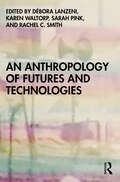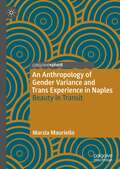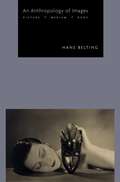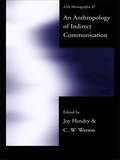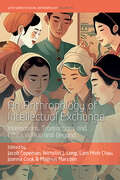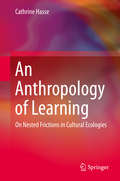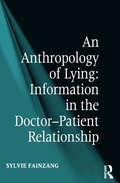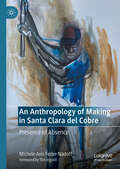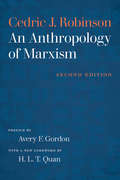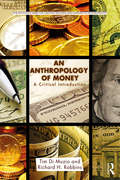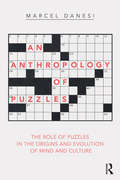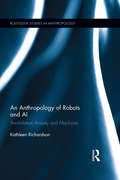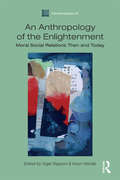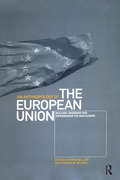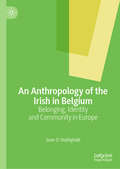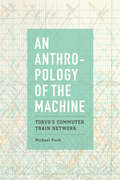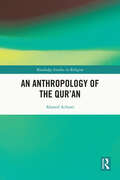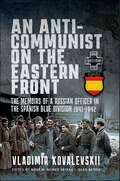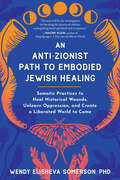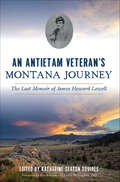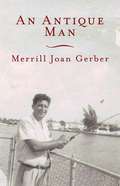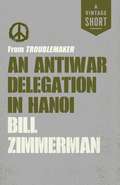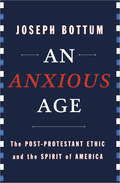- Table View
- List View
An Anthropology of Futures and Technologies
by Sarah Pink Karen Waltorp Débora Lanzeni Rachel C. SmithThis book examines emerging automated technologies and systems and the increasingly prominent roles that each plays in our lives and our imagined futures. It asks how technological futures are being constituted and the roles anthropologists can play in their making; how anthropologists engage with emerging technologies within their fieldwork contexts in research which seeks to influence future design; how to create critical and interventional approaches to technology design and innovation; and how a critical anthropology of the way that emerging technologies are experienced in everyday life circumstances offers new insights for future-making practices. In pursuing these questions, this book responds to a call for new anthropologies that respond to the current and emerging technological environments in which we live, environments for which thinking critically about the possible, plausible, and impossible futures are no longer sufficient. Taking the next step, this book asserts that anthropology must now propose alternative ways, rooted in ethnography, to approach and engage with what is coming and to contest dominant narratives of industry, policy, and government, and to respond to our contemporary context through a public, vocal, and interventional approach.
An Anthropology of Gender Variance and Trans Experience in Naples: Beauty in Transit
by Marzia MaurielloThis book recounts the author’s fieldwork among the trans and gender-variant communities in Naples. This is where a gender-variant figure, the femminiello, has found a safe environment within the city’s historical poorest neighborhoods, the so-called “quartieri popolari”, which were and continue to be culturally and socially connoted. The femminielli, who can be read as “suspended” figures between the feminine and the masculine, provide the background for a discourse on the meanings that genders and sexualities have assumed in modern Naples. This is done with significant openings to theoretical reasoning that is both extraterritorial and multidisciplinary. Starting from the micro context, the aim of the book is to explore the breadth and complexity of the gender variant and trans experience, with particular reference to the changing meanings of the body, which are also tied to the collective images of beauty in contemporary times.
An Anthropology of Images: Picture, Medium, Body
by Hans BeltingA compelling theory that places the origin of human picture making in the bodyIn this groundbreaking book, renowned art historian Hans Belting proposes a new anthropological theory for interpreting human picture making. Rather than focus exclusively on pictures as they are embodied in various media such as painting, sculpture, or photography, he links pictures to our mental images and therefore our bodies. The body is understood as a "living medium" that produces, perceives, or remembers images that are different from the images we encounter through handmade or technical pictures. Refusing to reduce images to their material embodiment yet acknowledging the importance of the historical media in which images are manifested, An Anthropology of Images presents a challenging and provocative new account of what pictures are and how they function.The book demonstrates these ideas with a series of compelling case studies, ranging from Dante's picture theory to post-photography. One chapter explores the tension between image and medium in two "media of the body," the coat of arms and the portrait painting. Another, central chapter looks at the relationship between image and death, tracing picture production, including the first use of the mask, to early funerary rituals in which pictures served to represent the missing bodies of the dead. Pictures were tools to re-embody the deceased, to make them present again, a fact that offers a surprising clue to the riddle of presence and absence in most pictures and that reveals a genealogy of pictures obscured by Platonic picture theory.
An Anthropology of Indirect Communication (ASA Monographs #Vol. 37)
by Joy Hendry C. W. WatsonSometimes we convey what we mean not by what we say but by what we do. This type of indirect communication is sometimes called 'indirection'. From patent miscommunication, through potent ambiguity to pregnant silence this incisive collection examines from a rare anthropological perspective the many aspects of indirect communication. From a Mormon Theme Park to carnival time on Montserrat the contributors analyse indirection by illustrating how food, silence, sunglasses, martial arts and rudeness call constitute powerful ways of conveying meaning. An Anthropology of Indirect Communication is an engaging text which provides a challenging introduction to this subject.
An Anthropology of Intellectual Exchange: Interactions, Transactions and Ethics in Asia and Beyond (WYSE Series in Social Anthropology #15)
by Magnus Marsden Jacob Copeman, Nicholas J. Long, Lam Minh Chau, Joanna CookDialogues, encounters and interactions through which particular ways of knowing, understanding and thinking about the world are forged lie at the centre of anthropology. Such ‘intellectual exchange’ is also central to anthropologists’ own professional practice: from their interactions with research participants and modes of pedagogy to their engagements with each other and scholars from adjacent disciplines. This collection of essays explores how such processes might best be studied cross-culturally. Foregrounding the diverse interactions, ethical reasoning, and intellectual lives of people from across the continent of Asia, the volume develops an anthropology of intellectual exchange itself.
An Anthropology of Learning: On Nested Frictions in Cultural Ecologies
by Cathrine HasseThis book has one explicit purpose: to present a new theory of cultural learning in organisations which combines practice-based learning with cultural models - a cognitive anthropological schema theory of taken-for-granted connections - tied to the everyday meaningful use of artefacts. The understanding of culture as emerging in a process of learning open up for new understandings, which is useful for researchers, practitioners and students interested in dynamic studies of culture and cultural studies of organisations. The new approach goes beyond culture as a static, essentialist entity and open for our possibility to learn in organisations across national cultures, across ethnicity and across the apparently insurmountable local educational differences which makes it difficult for people to communicate working together in an increasingly globalized world. The empirical examples are mainly drawn from organisations of education and science which are melting-pots of cultural encounters.
An Anthropology of Lying: Information in the Doctor-Patient Relationship
by Sylvie FainzangIn the era of health democracy, where a patient’s right to be informed is not only widely advocated but also guaranteed by law, what is the real situation regarding patient information? Do patients receive the information that they request with regard to their diagnosis, prognosis or treatments? And what information do patients themselves give to their doctors? Drawing on observational research in hospitals and covering the exchanges between doctors and patients on the subject of cancer treatment and that of other pathologies, this book reveals that the practice of telling lies is widespread amongst parties on both sides of the medical relationship. With attention to the manner in which information of various types is withheld and the truth concealed on either side of the doctor-patient relationship, the author explores the boundaries between what is said and what is left unsaid, and between those who are given information and those who are lied to. Considering the misunderstandings that occur in the course of medical exchanges and the differences between the lies told by doctors and patients, An Anthropology of Lying: Information in the Doctor-Patient Relationship analyses the role of mendacity in the exercise of, and resistance to power. A fascinating study of the mechanisms at work and social conditions surrounding the accomplishment of lying in medical settings, this book casts fresh light on a subject that has so far been overlooked. As such, it will appeal not only to sociologists and anthropologists of health and medicine, but also to medical professionals.
An Anthropology of Making in Santa Clara del Cobre: Presence of Absence
by Michele Avis Feder-NadoffThis book offers a nuanced reflection on the meaning of making and artisan agency, demonstrating how copper-smithing produces not only objects, but also lives, worlds, meanings, and social transformation. Through long-term ethnography, grounded in apprenticeship to master coppersmith Jesús Pérez Ornelas, Feder-Nadoff’s intimate description of communal and artisanal life in Santa Clara del Cobre, Michoacán, México provides a critical reappraisal of aesthetics and compelling ways to think about how aura and agency are produced. By mapping flows and frictions between persons, places, and things, this study closes the gap between economic and socio-political analysis of craft, on the one hand, and aesthetic, material, and phenomenological studies of making, on the other. Although craft historically plays a prominent national, even ideological role in Mexico, as in many countries, most artisans ironically remain absent, often living in marginalized, precarious circumstances. By tracing the cycles of life, death, and afterlife, of these maker-protagonists, their bodies of knowledge, skilled performances, and objects, this poetic monograph testifies to their presence.
An Anthropology of Marxism (Race And Representation Ser.)
by Cedric J. RobinsonAn Anthropology of Marxism offers Cedric Robinson's analysis of the history of communalism that has been claimed by Marx and Marxists. Suggesting that the socialist ideal was embedded both in Western and non-Western civilizations and cultures long before the opening of the modern era and did not begin with or depend on the existence of capitalism, Robinson interrogates the social, cultural, institutional, and historical materials that were the seedbeds for communal modes of living and reimagining society. Ultimately, it pushes back against Marx's vision of a better society as rooted in a Eurocentric society, and cut off from its own precursors. Accompanied by a new foreword by H.L.T. Quan and a preface by Avery Gordon, this invaluable text reimagines the communal ideal from a broader perspective that transcends modernity, industrialization, and capitalism.
An Anthropology of Money: A Critical Introduction (Routledge Series for Creative Teaching and Learning in Anthropology)
by Richard H. Robbins Tim Di MuzioAn Anthropology of Money: A Critical Introduction shows how our present monetary system was imposed by elites and how they benefit from it. The book poses the question: how, by looking at different forms of money, can we appreciate that they have different effects? The authors demonstrate how modern money requires perpetual growth, an increase in inequality, environmental devastation, increasing commoditization, and, consequently, the perpetual consumption of ever more stuff. These are not intrinsic features of money, but, rather, of debt-money. This text shows that, through studying money in other cultures, we can have money that better serves the broader goals of society.
An Anthropology of Puzzles: The Role of Puzzles in the Origins and Evolution of Mind and Culture
by Marcel DanesiAn Anthropology of Puzzles argues that the human brain is a "puzzling organ" which allows humans to literally solve their own problems of existence through puzzle format. Noting the presence of puzzles everywhere in everyday life, Marcel Danesi looks at puzzles in society since the dawn of history, showing how their presence has guided large sections of human history, from discoveries in mathematics to disquisitions in philosophy. Danesi examines the cognitive processes that are involved in puzzle making and solving, and connects them to the actual physical manifestations of classic puzzles. Building on a concept of puzzles as based on Jungian archetypes, such as the river crossing image, the path metaphor, and the journey, Danesi suggests this could be one way to understand the public fascination with puzzles. As well as drawing on underlying mental archetypes, the act of solving puzzles also provides an outlet to move beyond biological evolution, and Danesi shows that puzzles could be the product of the same basic neural mechanism that produces language and culture. Finally, Danesi explores how understanding puzzles can be a new way of understanding our human culture.
An Anthropology of Robots and AI: Annihilation Anxiety and Machines (Routledge Studies in Anthropology #20)
by Kathleen RichardsonThis book explores the making of robots in labs at the Massachusetts Institute of Technology (MIT). It examines the cultural ideas that go into the making of robots, and the role of fiction in co-constructing the technological practices of the robotic scientists. The book engages with debates in anthropological theorizing regarding the way that robots are reimagined as intelligent, autonomous and social and weaved into lived social realities. Richardson charts the move away from the “worker” robot of the 1920s to the “social” one of the 2000s, as robots are reimagined as companions, friends and therapeutic agents.
An Anthropology of Robots and AI: Annihilation Anxiety and Machines (Routledge Studies in Anthropology)
by Kathleen RichardsonThis book explores the making of robots in labs at the Massachusetts Institute of Technology (MIT). It examines the cultural ideas that go into the making of robots, and the role of fiction in co-constructing the technological practices of the robotic scientists. The book engages with debates in anthropological theorizing regarding the way that robots are reimagined as intelligent, autonomous and social and weaved into lived social realities. Richardson charts the move away from the “worker” robot of the 1920s to the “social” one of the 2000s, as robots are reimagined as companions, friends and therapeutic agents.
An Anthropology of the Enlightenment: Moral Social Relations Then and Today (Association Of Social Anthropologists Monographs)
by Nigel Rapport Huon WardleIn a time of intellectual uncertainty, the question of how we know what we do about human lives becomes ever more pressing. The essays collated in this volume argue that anthropology can be used to acknowledge, explore and interpret divergence and ideological conflict over human meaning. Using questions raised as part of the Enlightenment movement, this volume is structured around some of the key themes the Enlightenment fostered, including human nature, time, Earth and the Cosmos, beauty, order, harmony and design, moral sentiments, and the query of whether wealthy nations make for healthy publics. The volume focuses in particular on how 'moral sentiment' offered a guiding idea in Enlightenment thought. The idea of 'moral sentiment' is central to the essays' grappling with the ethical anxieties of contemporary anthropology. The essays therefore trace historical connections and fissures and focus on Adam Smith's attempts toward an understanding of what would later be called 'modernity'. With an afterword from Marilyn Strathern, this volume will be a strong addition to the Association of Social Anthropologists conference proceedings.
An Anthropology of the European Union: Building, Imagining and Experiencing the New Europe
by Irène BellierOne of the problems facing Europe is that the building of institutional Europe and top-down efforts to get Europeans to imagine their common identity do not necessarily result in political and cultural unity. Anthropologists have been slow to consider the difficulties presented by the expansion of the EU model and its implications for Europe in the 21st Century. Representing a new trend in European anthropology, this book examines how people adjust to their different experiences of the new Europe. The role of culture, religion, and ideology, as well as insiders' social and professional practices, are all shown to shed light on the cultural logic sustaining the institutions and policies of the European Union. On the one hand, the activities of the European institutions in Brussels illustrate how people of many different nationalities, languages and cultures can live and work together. On the other hand, the interests of many people at the local, regional and national levels are not the same as the Eurocrats'. Contributors explore the issues of unity and diversity in ‘Europe-building' through various European institutions, images, and programmes, and their effects on a variety of definitions of identity in such locales as France, Denmark, the United Kingdom, Ireland and Belgium.
An Anthropology of the Irish in Belgium: Belonging, Identity and Community in Europe
by Sean O’ DubhghaillThe first anthropological account of the Irish diaspora in Europe in the 21st century, this book provides a culture-centric examination of the Irish diaspora. Focusing less on an abstract or technical definition of Irish self-identification, the author allows members of this group to speak through vignettes and interview excerpts, providing an anthropological lens that allows the reader to enter a frame of self-reference. This book therefore provides architecture to understand how diasporic communities might understand their own identities in a new way and how they might reconsider the role played by mobility in changing expressions of identity. Providing firsthand, experiential and narrative insight into the Irish diaspora in Europe, this volume promises to contribute an anthropological perspective to historical accounts of the Irish overseas, theoretical works in Irish studies, and sociological examinations of Irish identity and diaspora.
An Anthropology of the Machine: Tokyo's Commuter Train Network
by Michael Fisch“An astute account of [Tokyo’s] commuter train network . . . and an intellectually stimulating invitation to rethink the interaction between humans and machines.” —Japan ForumWith its infamously packed cars and disciplined commuters, Tokyo’s commuter train network is one of the most complex technical infrastructures on Earth. In An Anthropology of the Machine, Michael Fisch provides a nuanced perspective on how Tokyo’s commuter train network embodies the lived realities of technology in our modern world. Drawing on his fine-grained knowledge of transportation, work, and everyday life in Tokyo, Fisch shows how fitting into a system that operates on the extreme edge of sustainability can take a physical and emotional toll on a community while also creating a collective way of life—one with unique limitations and possibilities.An Anthropology of the Machine is a creative ethnographic study of the culture, history, and experience of commuting in Tokyo. At the same time, it is a theoretically ambitious attempt to think through our very relationship with technology and our possible ecological futures. Fisch provides an unblinking glimpse into what it might be like to inhabit a future in which more and more of our infrastructure—and the planet itself—will have to operate beyond capacity to accommodate our ever-growing population.“Not a ‘rage against the machine’ but an urge to find new ways of coexisting with technology.” —Contemporary Japan“An extraordinary study.” —Ethnos“A fascinating in-depth account of the innovations, inventions, sacrifices, and creativity required to ensure Tokyo’s millions of commuters keep rolling. It also provides much food for thought as our transportation systems become increasingly reliant on automated technology.” —Pacific Affairs
An Anthropology of the Qur’an (Routledge Studies in Religion)
by Ahmed AchratiThis book presents an anthropological study of the Qur’an, offering an unprecedented challenge to some of the epistemological and metaphysical assumptions of the tawḥīdic discourses. Combining primary textual materials and anthropological analysis, this book examines transcendence as a core principle of the Qur’an, uniquely signified in the divine name al-Quddūs (the Holy). It shows how the tawḥīdic representations of Allah constitute an inversion of this attribute; examines how this inversion has been conceived, authorized, and maintained; and demonstrates how it has affected Islamic thinking and practices, especially as relates to authority. This book also explores how a return to the Qur’anic primacy of God’s otherness as al-Quddūs can influence Islamic thinking and practices moving forward. Therefore, it will be highly useful to scholars of Islamic Studies, philosophical theology, Qur’anic studies, political science, ethics, anthropology, and religious studies.
An Anti-Communist on the Eastern Front: The Memoirs of a Russian Officer in the Spanish Blue Division 1941-1942
by Vladimir KovalevskiVladimir Kovalevskii’s memoirs record in graphic detail a remarkable military career. As a soldier, a committed anti-communist and Russian patriot he saw from the inside a series of conflicts that ravaged Europe in the first half of the twentieth century. In the First World War he fought the Germans, as a White Russian he opposed the Bolsheviks. He joined the French Foreign Legion and served in Africa before fighting for Franco in the Spanish Civil War and for Hitler in the Spanish Blue Division on the Eastern Front in the Second World War. His memoirs give a vivid insight into the armies he fought with and the causes he fought for – and they show how eventually the mental toll became so great that he was devoured by his own contradictions and the contradictions of his times. His experiences on the Eastern Front during the Second World War were shocking. He hoped the German campaign in the Soviet Union would liberate the Russian people, but after witnessing the grim suffering inflicted on the civilian population by a brutal occupying army he was deeply disillusioned and tormented by a sense of guilt. In the late 1940s, in order to make sense of his life as a soldier and to document the extraordinary sights he’d seen, he wrote these memoirs in Russian. They were buried in an archive for over seventy years, but they have now been edited, annotated and translated for this first English edition.
An Anti-Zionist Path to Embodied Jewish Healing: Somatic Practices to Heal Historical Wounds, Unlearn Oppression, and Create a Liberated World to Come
by Wendy Elisheva Somerson PhDUnapologetically anti-Zionist and firmly rooted in Jewish spiritual values—a liberatory model for Jewish healing Body-based tools and faith-based practices for processing trauma, reclaiming our agency, and building a world where "never again" means "never again for anyone""...an accessible pathway for healing from historical trauma, releasing it from our bodies, and preventing it from being passed on to future generations. This may well be the missing piece for breaking the pattern of violence undergirding Israeli apartheid and occupation.&”—Naomi Klein, author of Doppelganger: A Trip Into the Mirror World Dr. Wendy Elisheva Somerson, PhD, shows how Jewish history lives in Jewish bodies—and how antisemitism and oppression disrupt our access to safety, dignity, and belonging. This unmetabolized trauma can lock us into a survival state that brings historical grief into the present moment…and keep us from exploring critical questions that help us tend our legacies and live into a better world.How does ancestral grief live on in our bodies and keep us from feeling safe—and how is that fear enacted on other peoples? How do we reconcile a history of persecution with the state power of Israel today?Each chapter invites us back into the body, exploring healing as a spiritual and political reclamation. With skills-based wisdom for trauma, safety, spiritually grounded intentions, and resourcing ourselves for difficult conversations, this book also helps readers understand: Trauma and healing through our bodiesJewish longing, belonging, legacies of assimilationHealing shame—of not being Jewish enough, of being too much, and of being complicitEmbodied experiences of Jewish resilience, ritual, and griefRooted in justice, care, and spiritual depth, this book asks us to live into a Judaism beyond Zionism. It invites us to heal toward liberation—to reclaim Jewish faith and release Jewish identity from the colonial project of Israel in power, skill, and community.
An Antietam Veteran's Montana Journey: The Lost Memoir of James Howard Lowell (Civil War Series)
by Katharine Seaton SquiresIn this recently unearthed memoir, Civil War veteran James Howard Lowell offers a firsthand account of his brutal journey west on a wagon train attacked by Indian Dog Soldiers. The Boston Yank staggers snow blind through a Laramie Plains blizzard to reach Salt Lake City, where he meets Brigham Young. In Montana, he joins an old forty-niner to work a mining claim, practices "tomahawk jurisprudence" in Fort Benton and builds a mackinaw to head downriver through Deadman Rapids to trade with the Crow and Gros Ventre tribes. Lowell's great-great-granddaughter edits this tale populated with colorful characters, narrow escapes and important historical events, such as the Baker Massacre. It features Lowell's letters to his sweetheart and Civil War correspondence.
An Antique Man
by Merrill Joan GerberThis is the poignant story of a loving, gentle man, "antique" by virtue, "an antique man" by profession. It is the story of his lingering death, of his transcendent courage, of the agony and solitude of those who must watch-his wife and two daughters. It is everyone's story in that it tells in specific and particular terms the general human experience of love and loss, suffering and death. It is agony redeemed by art. An Antique Man is also an extraordinary portrait of a tightly knit Jewish family and makes a strong comment about the phenomenon of human isolation, for in death this little family realizes how totally alone it is in the middle of Los Angeles, city of strangers. The events are described through a curtain of courage and the added dignity of shattering, strengthening love. It answers the question, "What use is there in reading fiction?" To experience the love and pain in this book is of the deepest private value.
An Antiwar Delegation in Hanoi: from Troublemaker
by Bill ZimmermanBill Zimmerman put his life at risk for the greater social good when he smuggled medicines to the front lines in North Vietnam and spent time filming in Hanoi under U.S. bombardment. In his extraordinary political memoir, he takes us into the hearts and minds of those making the social revolution of the sixties. Zimmerman—who crossed paths with political organizers and activists like Abbie Hoffman, Daniel Ellsberg, César Chávez, Jane Fonda, and Tom Hayden—captures a groundbreaking zeitgeist that irrevocably changed the world as we knew it.A Vintage Shorts Vietnam Selection. An ebook short.
An Anxious Age
by Joseph BottumWe live in a profoundly spiritual age, but not in any good way. Huge swaths of American culture are driven by manic spiritual anxiety and relentless supernatural worry. Radicals and traditionalists, liberals and conservatives, together with politicians, artists, environmentalists, followers of food fads, and the chattering classes of television commentators: America is filled with people frantically seeking confirmation of their own essential goodness. We are a nation desperate to stand of the side of morality--to know that we are righteous and dwell in the light. In An Anxious Age, Joseph Bottum offers an account of modern America, presented as a morality tale formed by a collision of spiritual disturbances. And the cause, he claims, is the most significant and least noticed historical fact of the last fifty years: the collapse of the mainline Protestant churches that were the source of social consensus and cultural unity. Our dangerous spiritual anxieties, broken loose from the churches that once contained them, now madden everything in American life. Updating The Protestant Ethic and the Sprit of Capitalism, Max Weber's sociological classic, An Anxious Age undertakes two case studies of contemporary social classes adrift in a nation without the religious understandings that gave them meaning. Looking at the college-educated elite he calls "the Poster Children," Bottum sees the post-Protestant heirs of the old mainline Protestant domination of culture: dutiful descendants who claim the high social position of their Christian ancestors even while they reject their ancestors' Christianity. Turning to the Swallows of Capistrano, the Catholics formed by the pontificate of John Paul II, Bottum evaluates the early victories--and later defeats--of the attempt to substitute Catholicism for the dying mainline voice in public life. Sweeping across American intellectual and cultural history, An Anxious Age traces the course of national religion and warns about the strange angels and even stranger demons with which we now wrestle. Insightful and contrarian, wise and unexpected, An Anxious Age ranks among the great modern accounts of American culture.From the Hardcover edition.
